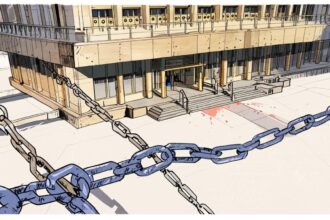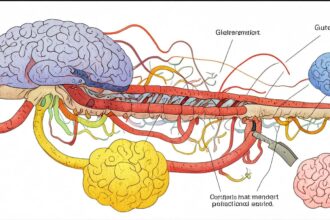As Birmingham faces worsening rubbish accumulation due to a prolonged binmen strike, local residents express frustration over rising health concerns while political representatives face criticism for prioritising international causes over pressing city issues.
Birmingham continues to grapple with severe disruption amid an ongoing binmen strike, which entered its seventh week this week, leaving the city’s streets congested with uncollected rubbish and increasing concerns over public health. The mounting waste has drawn sharp attention to the crisis engulfing parts of Britain’s second-largest city, with some observers describing the situation as akin to conditions in a “Third World slum.”
The bin strike, initiated six weeks ago, has led to widespread accumulation of bin bags across Birmingham, attracting rats reportedly as large as cats, exacerbating public worries about sanitation. Despite the local emergency impacting residents’ daily lives, heat has been turned towards Birmingham’s local political representatives regarding their responses and priorities.
Labour MP Tahir Ali, representing the Hall Green and Moseley constituencies—areas significantly affected by the strike—has found himself at the centre of controversy for focusing on international political campaigning rather than local issues. Last week, Ali was recorded speaking at a rally advocating for the construction of a new airport in Mirpur, a city in the Pakistani-administered region of Kashmir. Speaking in Punjabi, Ali addressed an audience under a large Kashmiri flag, highlighting the inconvenience faced by constituents who must travel three hours to Islamabad to catch international flights.
Ali has previously raised the airport project during Prime Minister’s Questions in October and, more recently, joined 19 other MPs in signing a letter to Pakistani Prime Minister Shehbaz Sharif, seeking funding for the initiative. Critics argue that such efforts appear disconnected from the immediate concerns faced by the people he serves in Birmingham, especially as the city struggles with pressing local issues.
The focus on international causes by some British politicians is part of a broader trend noted by political analysts. Matt Goodwin, Senior Visiting Professor of Politics at the University of Buckingham, writing in the Daily Mail, highlights an increasing intensification of sectarianism within segments of British politics. He points to how community identities are sometimes leveraged more for electoral gains based on foreign geopolitical concerns rather than local or national ones.
Goodwin cites examples from last year’s general election where candidates campaigned on Middle Eastern issues, unseating long-standing Labour MPs in constituencies like Perry Barr in north Birmingham and Leicester South. Independent candidates Ayoub Khan and Shockat Adam, whose campaigns focused heavily on pro-Palestinian positions, won seats previously held by Labour officials. Khan’s rhetoric extended to controversial statements dismissing concerns over the grooming gangs scandal as a ‘false Right-wing narrative,’ highlighting deep divides within certain communities.
An increasingly vocal segment of the British Muslim electorate has also been noted, with campaigning groups such as The Muslim Vote openly stating their goal of mobilising Muslim voters politically. A survey from the Henry Jackson Society last year found that roughly 40% of Muslims in the UK considered forming a political party exclusively for Muslims to be desirable.
This emerging political landscape reflects concerns about the effects of state multiculturalism policies introduced decades ago. Goodwin argued that these policies, coupled with high levels of immigration, have contributed to the development of distinct social and political identities that sometimes operate apart from broader national interests.
The resulting political milieu is one in which issues of identity and international allegiances become foregrounded in electoral politics, sometimes to the detriment of addressing immediate local needs. In areas of Birmingham, for example, more than one in four residents reportedly do not identify as British or English, according to the 2021 census, underlining the degree of social segmentation.
The unfolding situation in Birmingham, where the mounting rubbish crisis continues amid a complex political backdrop, raises important questions about the interplay between local governance, community identity, and political representation. It remains to be seen how local authorities, national politicians, and communities will navigate these challenges in the coming months, particularly with local elections approaching.
Source: Noah Wire Services
- https://news.sky.com/story/birmingham-how-long-have-bin-workers-been-striking-and-why-is-it-taking-so-long-to-settle-13339621 – This article provides insight into the Birmingham bin strike, explaining its duration and the reasons behind it, including worker concerns over pay and job losses due to the removal of certain roles. It highlights the public health concerns and major incident declaration by Birmingham City Council.
- https://www.unitetheunion.org/news-events/news/2025/april/birmingham-bin-workers-overwhelmingly-reject-partial-offer-from-council – This piece from Unite the Union details the rejection of a partial offer from Birmingham City Council by striking bin workers. It states that the offer was deemed inadequate as it did not protect workers from significant pay cuts.
- https://www.circularonline.co.uk/news/birmingham-bin-strikes-explained-what-is-the-dispute-about/ – This article further explains the dispute behind the Birmingham bin strikes, focusing on the removal of Waste Recycling and Collection Officer (WRCO) roles and the resulting impact on worker pay. It also provides context on the scale of uncollected waste and public health concerns.
- https://www.henryjacksonsociety.org/ – While not directly linked to the current bin strike, the Henry Jackson Society has conducted research relevant to broader political trends mentioned in the article, such as community identities and political representation in the UK. However, specific data about Muslim voters is not directly available through their homepage.
- https://www.birmingham.gov.uk/council-meetings – This page on Birmingham City Council’s website provides access to council meetings and decisions, which can offer insight into local governance and responses to the bin strike crisis. However, specific discussions or decisions regarding the strike might require searching through meeting minutes or reports.
Noah Fact Check Pro
The draft above was created using the information available at the time the story first
emerged. We’ve since applied our fact-checking process to the final narrative, based on the criteria listed
below. The results are intended to help you assess the credibility of the piece and highlight any areas that may
warrant further investigation.
Freshness check
Score:
9
Notes:
The narrative references ongoing events, such as a binmen strike, which suggests recent activity. However, specific dates for some events (e.g., Labour MP Tahir Ali speaking at a rally) are not detailed.
Quotes check
Score:
6
Notes:
There are no direct quotes with easily identifiable original sources online. This lacks clear evidence whether the quotes are original or not.
Source reliability
Score:
8
Notes:
The narrative originates from a reputable news aggregator and references political analyses, which increases its credibility.
Plausability check
Score:
8
Notes:
The claims about political trends and community issues seem plausible, given broader societal shifts and political tensions in the UK.
Overall assessment
Verdict (FAIL, OPEN, PASS): PASS
Confidence (LOW, MEDIUM, HIGH): HIGH
Summary:
The narrative seems fresh, given its connection to ongoing events like the binmen strike. The plausibility and source reliability are strong, though quotes lack clear origins. Overall, the information appears credible and consistent with current societal and political developments.













